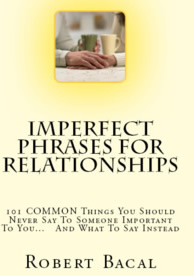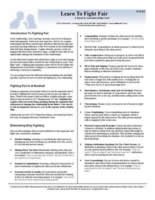All Couples Should Learn To FIght Fair. Here's How
Check out our mini-guide on how to fight fair, and stop letting badly handled conflict cause pain in your relationships. Download it NOW!
Search Our Network Of Business and Personal Development Sites
Everyone can learn to be a better conflict manager
Managing Workplace Conflicts By Garrett Coan
Summary: An easy to read article that covers the various types of workplace conflict, what influences our responses to conflict, suggestions on how to react when workplace conflict occurs and more. Short and to the point, and clearly and concisely written overview of the conflict process.
Kinds of Workplace Conflicts
Let’s start by identifying where conflicts happen. Think about the kinds of conflicts that happen around your workplace.
• Disagreements over turf (who should do what)
• Disagreements over policy (how things should be done)
• Conflicts of personality and style
Common Ways of Dealing with Conflict
These are some of the ways we typically deal with conflict. Do you see yourself in any of them?
• Avoid the conflict.
• Deny the conflict; wait until it goes away.
• Change the subject.
• React emotionally; become aggressive, abusive, hysterical, or frightening.
• Find someone to blame.
• Make excuses.
• Delegate the situation to someone else.
All of these responses are nonproductive. Some of them are actually destructive. This is why learning to manage conflict is so important.
Effect on Work Relationships
The workplace is a system of relationships. Relationships have many different aspects; here are several examples:
Trust
Teamwork
Quality
Morale
Self-esteem
Loyalty
Respect for boss
When conflicts are handled well, there’s a positive effect on work relationships. When they are not, these factors can deteriorate. Productivity and the free expression of ideas are also impacted.
Factors That Affect How People Manage Conflict
The skills involved in managing conflict are learned behaviors. None of us is born knowing how to deal with differences of opinion, arguments, or turf wars. Some of the factors that affect how we behave in the face of conflict are:
1. Status: People in higher-status positions usually feel freer to engage in conflict and are less likely to avoid confrontation.
2. Company style or unwritten rules: Some companies encourage conflict; others have unwritten rules that it is to be contained or avoided.
3. Gender differences: Males are generally encouraged to be more confrontational than females.
4. Behavior learned in families: In some families, conflict and confrontation are a communication style. In others, conflict always remains hidden.
5. Behavior learned from role models: People who have had a teacher or boss who modeled effective conflict-resolution skills are more likely to develop these skills themselves.
Conflict Resolution Skills
No one is born knowing how to resolve conflicts. Conflict resolution is a set of skills that anyone can learn. Let’s look at two important ones: active listening and conflict deescalation skills.
Active Listening
Active listening is a valuable skill for resolving conflicts because it enables you to demonstrate that you understand what another person is saying and how he or she is feeling about it.
Active listening means restating, in your own words, what the other person has said.
Active listening is a way of checking whether your understanding is correct. It also demonstrates that you are listening and that you are interested and concerned. These all help resolve a situation when there are conflicting points of view.
Active listening responses have two components: (1) naming the feeling that the other person is conveying, and (2) stating the reason for the feeling.
Here are some examples of active-listening statements:
“Sounds like you’re upset about what happened at work.”
“You’re annoyed by my lateness, aren’t you?”
“You sound really stumped about how to solve this problem.”
“It makes you angry when you find errors on Joe’s paperwork.”
“Sounds like you’re really worried about Wendy.”
“I get the feeling you’re awfully busy right now.”
Actively listening is not the same as agreement. It is a way of demonstrating that you intend to hear and understand another’s point of view.
Benefits of Active Listening
If a person uses active listening as part of his or her communication style at work, how would that be good for resolving conflicts, i.e., what are the benefits?
1. It feels good when another person makes an effort to understand what you are thinking and feeling. It creates good feelings about the other person and makes you feel better about yourself.
2. Restating what you’ve heard, and checking for understanding, promotes better communication and produces fewer misunderstandings.
3. Responding with active listening has a calming effect in an emotional situation.
Conflict De-escalation
Everyone has been in an argument that has escalated. Before you know it, it’s blown out of proportion. Let’s think for a moment about some actions that will help you deescalate a conflict. In your experience, what actions put a stop to the defend/attack spiral?
• Stick with “I” statements; avoid “you” statements.
• Avoid name-calling and put-downs (“A reasonable person could see that...”).
• Soften your tone.
• Take a time-out (“Let’s take a break and cool down”).
• Acknowledge the other person’s point of view (agreement is not necessary).
• Avoid defensive or hostile body language (rolling eyes, crossing arms in front of body, tapping foot).
• Be specific and factual; avoid generalities.
Conflict Prevention Skills
Now that we’ve talked about how to resolve a conflict, let’s look at how to prevent conflicts from happening. Here are a few ideas:
Bring issues out in the open before they become problems.
• Be aware of triggers and respond to them when you notice them. • Have a process for resolving conflicts. Bring it up at a meeting and get agreement on what people should do in cases of differing viewpoints.
• Teach everyone conflict-resolution skills and expect people to use them.
Garrett Coan is a professional therapist,coach and psychotherapist. His two Northern New Jersey office locations are accessible to individuals who reside in Bergen County, Essex County, Passaic County, Rockland County, and Manhattan. He offers online and telephone coaching and counseling services for those who live at a distance. He can be accessed through http://www.creativecounselors.com or 201-303-4303.
Article Source: http://EzineArticles.com/
 Manage Conflict - Resolve Conflict - Prevent Conflict
Manage Conflict - Resolve Conflict - Prevent Conflict 

